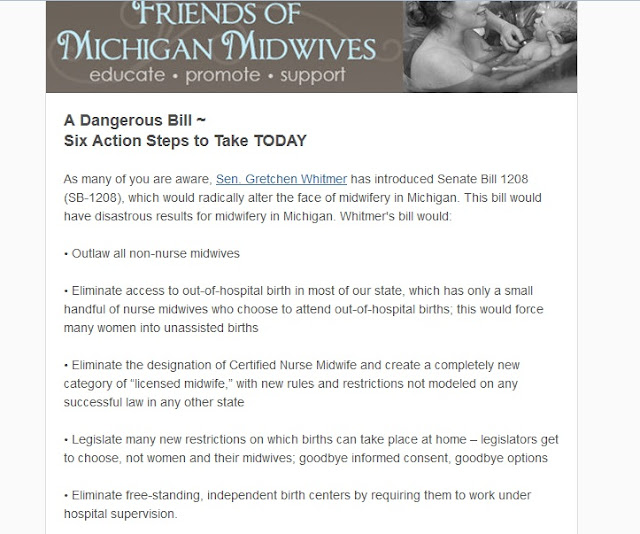The Friends of MI Midwives recently posted a lovely piece of fear mongering on their blog entitled, "Will Michigan Outlaw Your Midwife?" in their response to Senate Bill 1208
Safer Midwifery for Michigan would like to address each point of their position and address the misconceptions:
SB 1208 will outlaw all non-nurse midwives = FALSE
SB 1208 requires RN training to be eligible for midwifery licensure, but does not require AMCB training as an advance practice nurse and certified nurse midwife for entry into practice. The state is allowed to permit a license to a midwife with an RN license and additional training in midwifery. Please read this carefully, this does not limit licensure exclusively to certified nurse midwives.
SB 1208 requires RN training to be eligible for midwifery licensure, but does not require AMCB training as an advance practice nurse and certified nurse midwife for entry into practice. The state is allowed to permit a license to a midwife with an RN license and additional training in midwifery. Please read this carefully, this does not limit licensure exclusively to certified nurse midwives.
Eliminate access to out-of-hospital birth in most of our state = FALSE
FOMM is saying that since few CNMs practice OOH, this will limit the availability of OOH midwifery practices. The first fault in this reasoning is assuming that this bill limits licensure exclusively to nurse-midwives. This is false. Please see our first point.
FOMM is saying that since few CNMs practice OOH, this will limit the availability of OOH midwifery practices. The first fault in this reasoning is assuming that this bill limits licensure exclusively to nurse-midwives. This is false. Please see our first point.
Elminate the designation of Certified Nurse Midwife and create a new category of licensed midwife = TRUE
This bill aims to license all midwives practicing in the state of Michigan in an attempt to standardize practice guidelines. Some may have to boost their coursework or skills, but the opportunity is present for all midwives to earn a license. A few of our blog readers have commented that this has the potential to restrict hospital based CNM practice. This is not the intent of this bill, and I am confident the language will be revised.
This bill aims to license all midwives practicing in the state of Michigan in an attempt to standardize practice guidelines. Some may have to boost their coursework or skills, but the opportunity is present for all midwives to earn a license. A few of our blog readers have commented that this has the potential to restrict hospital based CNM practice. This is not the intent of this bill, and I am confident the language will be revised.
New York State licensed midwives under a board of midwifery in 1992. The credential permitted to practice under this law was the AMCB trained CM. And in the past 20 years, some CPMs have become licensed as CMs in New York. This is another potential revision.
Legislate many new restrictions on which births can take place at home = FALSE
Safer Midwifery for Michigan advocates for the safe practice of midwifery. It is in the state’s interest to minimize risk of injury or death during homebirth, especially if state is authorizing license for these professionals, as well as state-funded Medicaid payments to these professionals. Note – this bill does not criminalize home birth. It restricts who can use the term “midwife” or “licensed midwife” in providing home birth services and outlines a safe practice guidelines for licensed midwifery practice.
Safer Midwifery for Michigan advocates for the safe practice of midwifery. It is in the state’s interest to minimize risk of injury or death during homebirth, especially if state is authorizing license for these professionals, as well as state-funded Medicaid payments to these professionals. Note – this bill does not criminalize home birth. It restricts who can use the term “midwife” or “licensed midwife” in providing home birth services and outlines a safe practice guidelines for licensed midwifery practice.
Eliminate free-standing , independent birth centers by requiring them to work under hospital supervision = FALSE
Let's look at the SB1208 language regarding birth center licensure:
(B) PRESENT PROOF SATISFACTORY TO THE DEPARTMENT THAT THE
FACILITY HAS A CONTRACTUAL RELATIONSHIP WITH AN OBSTETRICIAN-
GYNECOLOGIST WHO IS LICENSED AS A PHYSICIAN UNDER ARTICLE 15, A
GROUP OF PHYSICIANS LICENSED UNDER ARTICLE 15, OR A HOSPITAL
LICENSED UNDER ARTICLE 17, THAT AGREES TO PROVIDE CONSULTING
SERVICES DURING DELIVERIES.
(B) PRESENT PROOF SATISFACTORY TO THE DEPARTMENT THAT THE
FACILITY HAS A CONTRACTUAL RELATIONSHIP WITH AN OBSTETRICIAN-
GYNECOLOGIST WHO IS LICENSED AS A PHYSICIAN UNDER ARTICLE 15, A
GROUP OF PHYSICIANS LICENSED UNDER ARTICLE 15, OR A HOSPITAL
LICENSED UNDER ARTICLE 17, THAT AGREES TO PROVIDE CONSULTING
SERVICES DURING DELIVERIES.
Providing proof of a relationship with a OB/GYN is not hospital supervision - it is a way for providing accountable, quality assurance to the clients of the birth center. The Midwives Model of Care includes:
"Identifying and referring women who require obstetrical attention."
This provision is included in SB 1208 to assure that licensed birth centers provide care that is consistent with their own widely-publicized Midwives Model of Care statement.
To everyone supporting HB 5070 - please be informed consumers, and do your research. Don't believe everything you're told by your midwife, or by those purporting to be "friends" of midwives. Do your homework. Read the bills yourself. Take responsibility for your legislation. You are capable of making an informed, autonomous choice, and knowing the facts. Midwives are experts at supporting your individualized, informed decisions. Don't let them tell you what to do.




